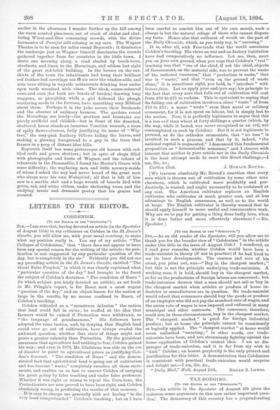LETTERS TO THE EDITOR.
COBDENISM.
[TO THE EDITOR OF THE " SPECTATOR."] am sure that, having devoted an article (in the Spectator of August 11th) to my criticisms on Cobden in the St. James's Gazette, you will allow me, with your usual courtesy, to state what my position really is. You say of my article, " The Collapse of Cobdenism," that "there does not appear to have been any special reason for the writing of the article; its pub- lication is not suggested by any particular question of the day, but is completely in the air." Evidently you did not see my preceding article in the St. James's Gazette, entitled " The Great False Prophet," in which it was clearly explained what "particular question of the day" had brought to the front the subject of Cobden's doctrines. " The condition of Essex" (to which subject you lately devoted an article), as set forth in Mr. Pringle's report, is for Essex men a most urgent "question of the day," and an object-lesson for the nation at large in the results, by no means confined to Essex, of Cobden's teaching.
Cobden ridiculed as a "monstrous delusion" the notion that land could fall in value; he scoffed at the idea that farmers would be ruined if Protection were withdrawn, as " the language of grandmamma." His followers have adopted the same tactics, and, by denying that English land could ever go out of cultivation, have always evaded the awkward question, whether that state of things might not prove a greater calamity than Protection. By the persistent assurance that agriculture had nothing to fear, Cobden gained his way ; and even in 1879, Mr. Gladstone was able on the eve of disaster to point to agricultural prices as justifying Cob- den's forecast. "The condition of Essex" and the demon- strated fact that agricultural land is going out of cultivation and has become "waste," completely smashes all these state- ments, and enables us at last to convict Cobden of carrying his great policy by false teaching and under false pretences. Whether it was right or wrong to repeal the Corn-laws, the Protectionists are now proved to have been right, and Cobden absolutely wrong, in predicting the results of that measure. It is easy to charge me generally with not having " in the very least comprehended" Cobden's teaching ; but as I have been careful to convict him out of his own mouth, such to charge is but the natural refuge of those who cannot dispute my facts. Hence also that outburst of wrath on the part of the Daily Chronicle, which, as you truly say, is " amusing."
It is, after all, with Free-trade that the world associates Cobden's teaching. His views on war and on factory legislation have had comparatively no influence. Let me, then, meet you on your own ground, when you urge that Cobden's " real teaching was that "one of the chief, if not the chief, objects of Government, on the material side, was to prevent the waste of the national resources," that "protection is waste," that war is " waste," and that " even on the ground of waste alone," it is sometimes right, you hold, to " interfere " with laissez-faire. Let us apply your and (you say) his principle to the fact that every acre that falls out of cultivation will cost from £10 to £15 to reclaim. This is equivalent to saying that its falling out of cultivation involves a sheer " waste " of from £10 to 215 ; a worse waste " even than naval or military armament, for it is not spent on labour, but is simply lost to the nation. Now, it is perfectly legitimate to argue that this is a less evil than wheat at forty shillings a quarter (which, by the way, while it lasted, was never recognised as an evil, nor contemplated as such by Cobden). But it is not legitimate to pretend, as do the orthodox economists, that " no loss " is involved in such a process, and that by it, indeed, "the national capital is augmented." I denounced this fundamental proposition as " demonstrable nonsense," and I observe with interest that neither in your article nor in the Daily Chronicle is the least attempt made to meet this direct challenge.—I am, Sir, &c., [We traverse absolutely Mr. Round's assertion that every. acre which is thrown out of cultivation by some other acre elsewhere, which is cultivated more profitably and pro- ductively, is wasted, and ought necessarily to be reclaimed at any cost. The American cultivator replaces an English cultivator who cultivates at much greater cost, and at less advantage to English consumers, as well as to the world at large. The English cultivator is thereby warned that he should apply himself to more useful and remunerative work. Why are we to pay for getting a thing done badly here, when it is done better and more effectively elsewhere P Speciator,]


































 Previous page
Previous page